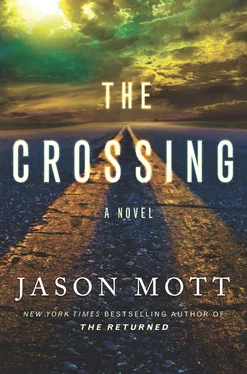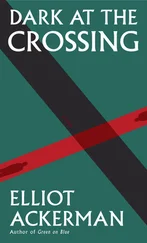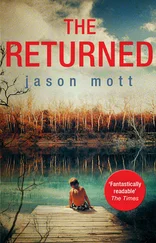“Right there,” I said, pointing ahead.
“I see it,” Tommy said, aiming for where the trees were thickest. There was a scrub of green pines and bare oaks. Not much, but enough to make the car difficult to see from the road when the sun finally came up.
“You kids really should think this over,” Gannon said. I thought I heard genuine concern in his voice, but whether it was for us or for himself was hard to say. As the car plunged into one final dip that sent us all bouncing, Gannon grabbed his father to steady the man. “It’s okay, Pop,” he cooed. “I got you.”
Tommy pulled the car to a stop and put it in Park. “Now what?”
“Leave it running,” I replied.
“What about poison?” Tommy asked.
“What poison?”
“Carbon dioxide.”
“Carbon monoxide,” Gannon corrected him, turning and looking at me through the thick Plexiglas divider. “He’s afraid we’ll suffocate while we’re sitting here waiting to be found,” he continued. “He’s got a right to be scared. It’s bad enough that you’re locking a sick man like my father in here, but if something happens to me while I’m waiting—anything at all, even if I have a damn heart attack from boredom—that’s manslaughter for the both of you. If you’re lucky. But they won’t let you have luck. Not with a dead cop on their hands. So they’ll swing for the fences. Try you both as adults. Murder. First-degree. ‘With foresight and malice.’ That’s what they’ll say.”
“Is that true?” Tommy asked.
Even I wasn’t immune to what Gannon had said. He’d managed to paint a picture in my mind—Tommy and me in a courtroom, on trial; Tommy would get the harder sentence because that had always been his lot in life; they’d send him to the electric chair and put me in prison; but they wouldn’t keep me there on account of how smart I was; they’d figure some way out for me on account of how I was special; that had always been my lot in life.
I walked on water. Tommy only choked on it.
“Just do what I told you, Tommy,” I replied. “We’ll leave the heat on medium and crack the windows. He’ll be fine. I promise.”
Tommy nodded in assent. He switched off the headlights and set the heater temperature as he had been told.
“Good,” I said. “Now get out.”
“Why?” Tommy asked.
“Just go, Tommy. I’ll be right behind you.”
Tommy stared at me. “I’m not going to do anything,” I said. I rapped my knuckles against the Plexiglas dividing the front and back of the squad car. “Couldn’t even if I wanted to. And you’ve got the gun, after all.”
“That’s right,” Tommy said, his voice full of sudden authority. “...that’s right.” Finally he opened the driver’s door and stepped out into the cold.
I turned in my seat, looking back on Jim Gannon. “Once the sun comes up it won’t take them long to find you. It’ll be a little embarrassing, so you’re welcome to tell them whatever story you want about how you wound up here. If I were you, I would say it was a prank.”
Gannon barked a sharp laugh. “A prank?”
“Yep,” I replied. “Just the local cops having a little bit of fun with you. You can say that you and them go way back. You just happened to run into them as you were passing through, on your way home from a law enforcement training seminar. That’ll explain why you were three states outside of your jurisdiction in your squad car and uniform.”
“Jurisdiction doesn’t apply with runaway children,” Gannon said. “But you already know that, don’t you, Virginia? You’re the smart one.” He slumped in the seat and checked the back of his head once more to be sure it wasn’t bleeding.
“Just say that they were some friends of yours and this was their way of being funny. They put you in the back seat of your own car and left you out here. It’s believable.”
“You got one hell of a mind on you,” Gannon replied. “But you already know that.”
“And he’ll be okay,” I said, looking at Gannon’s father.
“Are you asking me or telling me?” Gannon replied.
I looked out the car window at Tommy. He was standing just beside the car, watching our conversation.
Gannon’s eyes followed mine.
“Just let us go, Jim,” I said. My voice was softer than I had planned. There was a levee inside me that was on the verge of breaking all of a sudden. I didn’t know when it had begun swelling—I’ve never been particularly good with emotions. The energy it takes to keep all of the memories at bay tends to push down the feelings connected with those memories. It’s the only way that someone like me, who lives as much in the past as they do in the present, can exist without reliving everything again and again. So I learned to keep my feelings at arm’s length, but the problem with that is that they always eventually push in, suddenly and without warning. “Just go back home and let Tommy and me have this trip. And once it’s over...” I hesitated, then pushed on. “Once it’s over I’ll talk Tommy into coming back. It’ll be like nothing ever happened.”
“You just don’t get it, do you?” Gannon said. “He showed me his papers. He’s already overdue. That means they’ve already put him on the dodge list. That means jail first and then the war. But if I bring him back, I can help soften that. I come from three generations of lawmen. My name counts for something. I can smooth all of this out for him. Make it so that, when he goes off to fight, he does it with honor. The way he’s supposed to. There’s a principle at work here.” Gannon clucked his tongue. “The thing that amazes me the most is how proud Tommy was when he showed me that letter. Never seen him so proud. Like getting drafted was the best thing that ever happened to him.”
“Living was the best thing that ever happened to him,” I said. “I’m just trying to keep that going for as long as I can.” Then I opened the door before any more could be said and stepped out into the cold, leaving Gannon alone with his father and, perhaps for the first time in his life, powerless, in spite of all the instruments and ornaments of the Law.
* * *
Go back far enough and you’ll find that Jim Gannon came from a long line of policemen. He called them “lawmen” on the night when he sat me down and recounted to me the names and stories of the three generations that had come before him. He had never called them lawmen before. But once he was finally convinced that I truly did remember everything I ever saw or heard, he brought me into the living room and sat down in front of me with an old scrapbook filled with photos and news clippings and recounted to me all the stories he could remember having to deal with his father, William Gannon Jr.; his grandfather, William Gannon Sr.; and his great-grandfather, Thomas Gannon. “All good lawmen. Each one of them,” he said.
It took him a full hour and a half to talk about what was important. There was the story of how his great-grandfather had come over from Europe and immediately gone out West, back before the West was settled, back when the Indians hadn’t yet been treatied into submission. And Tom Gannon, seeing the way things needed to be if this country was going to work out, took up the badge as a United States marshal. Years later, when his own son shunned being a marshal but took a fancy to the art of sheriffing, Tom was only slightly upset about it. And when William Sr. passed on his badge to William Jr., it was already decided that, when Jim Gannon was born, he would take up the mantle. But then Gannon’s father had a stroke when he was young and never recovered and a new sheriff won the election. Gannon hadn’t been old enough to run and now, fifteen years later, he still hadn’t managed to get beyond being a deputy.
Читать дальше












